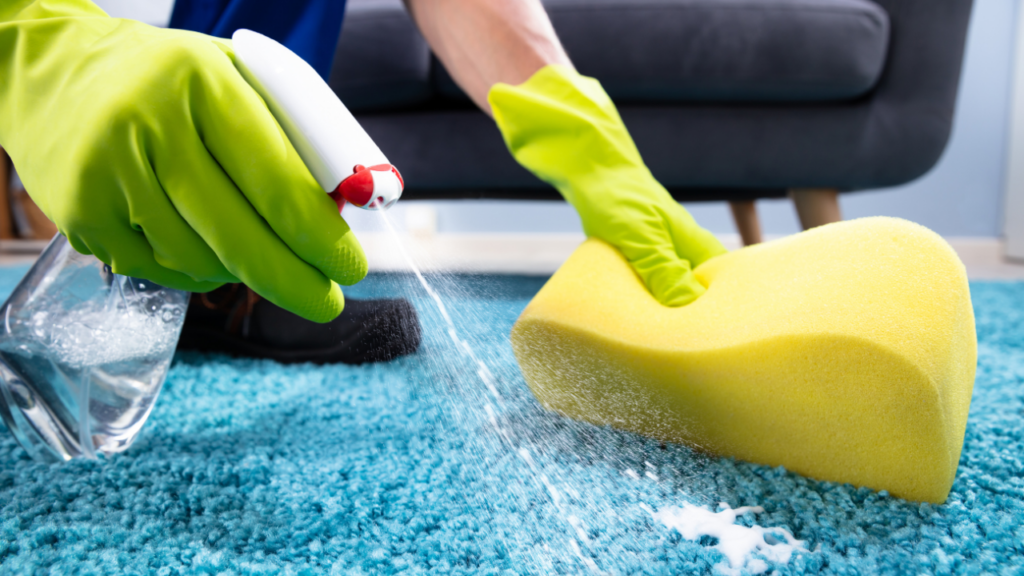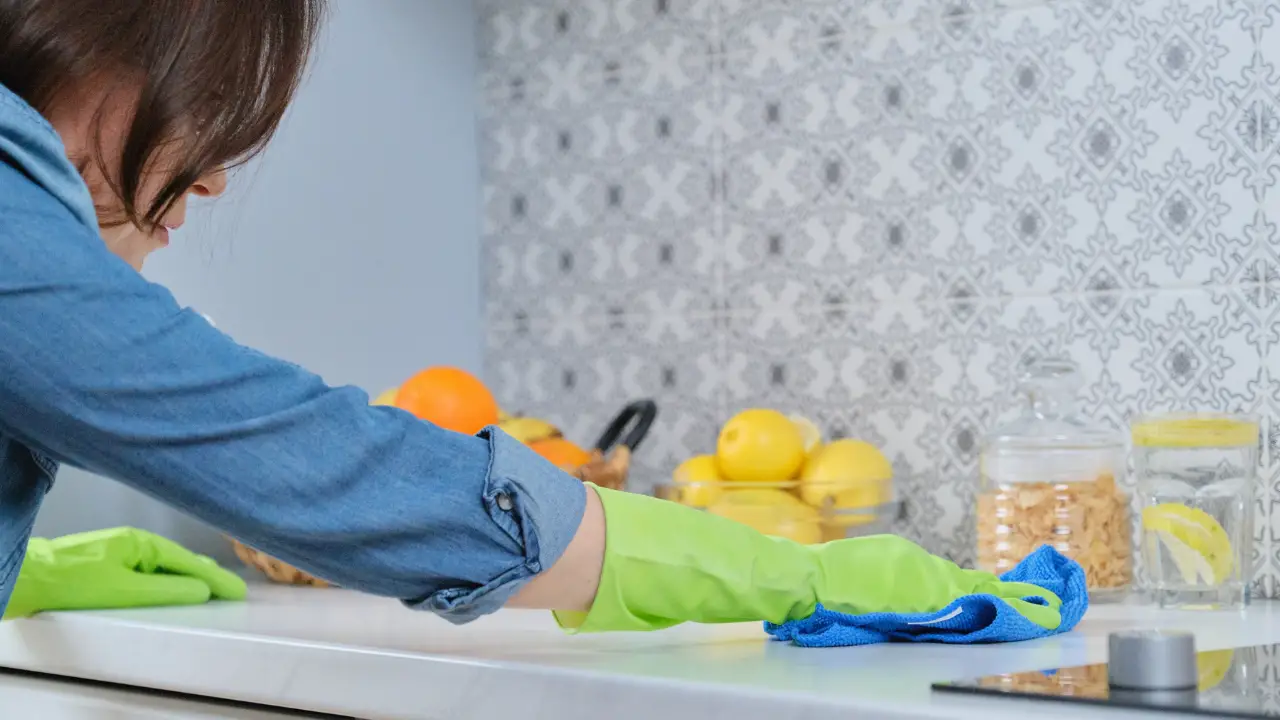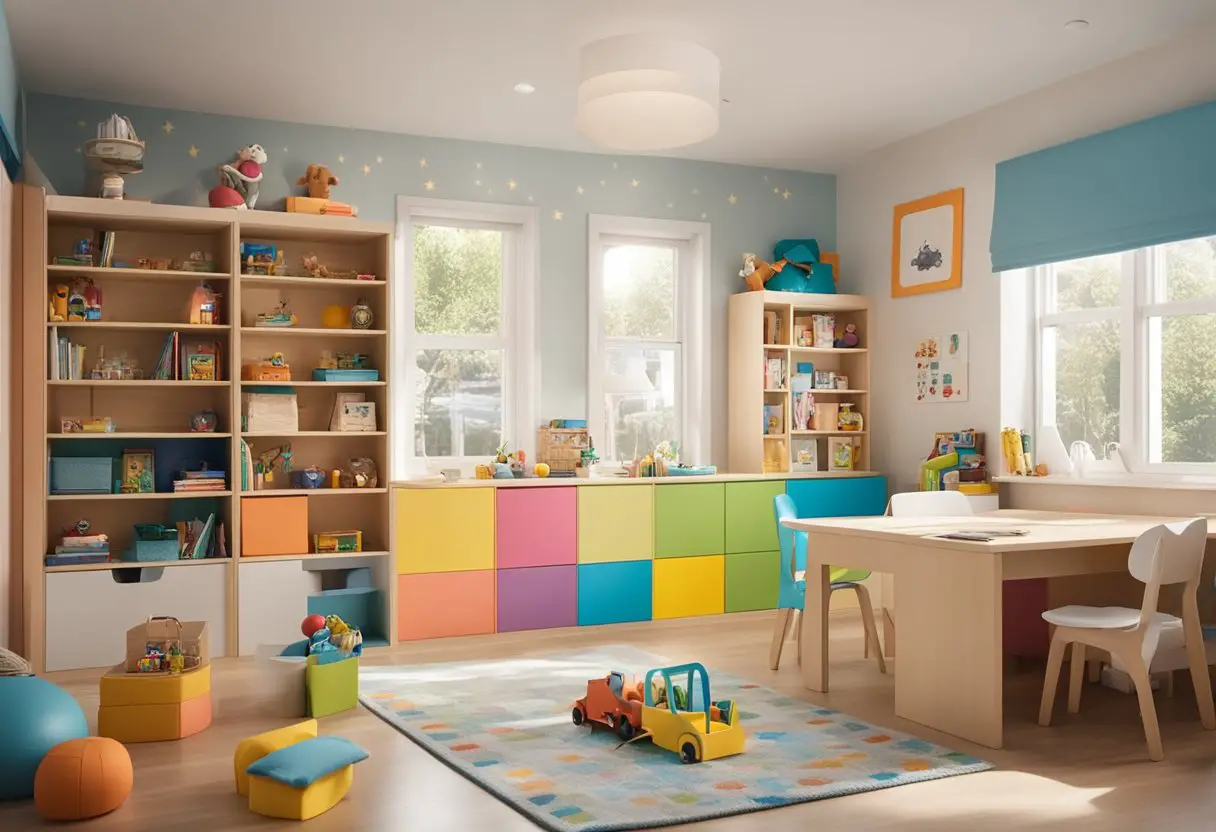Living in shared accommodation as a student can be a fun and exciting experience. You get to meet new people, make friends, and share experiences. However, with shared living comes shared responsibilities, and one of them is keeping the living space clean. It can be a challenge to keep a clean and organized living space when living with roommates who may not have the same level of cleanliness as you. But don’t worry, with a few simple cleaning tips, you can maintain a clean and comfortable living space that everyone can enjoy.
Understanding shared accommodation is the first step in keeping it clean. When you live with roommates, you need to be mindful of their space and belongings. Respect their privacy and keep their areas clean. Establishing daily cleaning habits, such as wiping down surfaces and washing dishes after use, can help prevent clutter and mess from accumulating. Weekly cleaning routines, such as vacuuming and dusting, can help maintain a clean and healthy living environment. Monthly deep cleaning can help tackle more significant cleaning tasks, such as cleaning appliances and organizing storage spaces. Proper waste management is also essential to ensure a clean and hygienic living space. By following these simple cleaning tips, you can maintain a clean and organized living space that everyone can enjoy.
Table of Contents
Key Takeaways
- Establish daily cleaning habits to prevent clutter and mess from accumulating.
- Follow weekly cleaning routines to maintain a clean and healthy living environment.
- Proper waste management is essential to ensure a clean and hygienic living space.

Understanding Shared Accommodation
Living in shared accommodation can be a great way to save money and make new friends. However, it can also be challenging, especially when it comes to cleaning. Here are some things to keep in mind when living in shared accommodation:
- What is shared accommodation? Shared accommodation is when you live with other people who are not your family members. This can include house shares, flat shares, and student accommodation. Each person usually has their own bedroom, but shares a bathroom, kitchen, and living area.
- What are the benefits of shared accommodation? Living in shared accommodation can be more affordable than renting a place on your own. It can also be a great way to meet new people and make friends. Additionally, sharing responsibilities like cleaning and cooking can help you develop important life skills.
- What are the challenges of shared accommodation? Living in shared accommodation can be challenging because you have to share common spaces with other people. This can lead to disagreements over cleaning, noise, and other issues. Additionally, you may have to deal with different personalities and lifestyles, which can be difficult to navigate.
- What are some tips for living in shared accommodation? To make living in shared accommodation easier, it’s important to establish clear rules and expectations with your housemates. This can include creating a cleaning schedule, setting quiet hours, and discussing how to split bills. Additionally, it’s important to be respectful of your housemates’ space and belongings, and to communicate openly and honestly when issues arise.
Living in shared accommodation can be a great experience if you approach it with the right mindset and take steps to establish a positive living environment. By being respectful, communicative, and proactive, you can make the most of your shared living situation and enjoy all the benefits it has to offer.
Daily Cleaning Habits
Living in shared accommodation can be challenging, especially when it comes to keeping the communal areas clean. However, with a few daily cleaning habits, you can keep your shared space tidy and avoid any arguments with your flatmates.
Here are some daily cleaning habits that you can incorporate into your routine:
- Wash Dishes After Use: Dirty dishes can pile up quickly in a shared kitchen, leading to unpleasant odours and attracting pests. Make it a habit to wash your dishes immediately after use, and encourage your flatmates to do the same. If you don’t have a dishwasher, consider taking turns to wash the dishes or use a dish rack to dry them.
- Wipe Down Surfaces: Wipe down kitchen surfaces, such as countertops and tables, after every use. This will prevent the build-up of dirt and bacteria, and keep your kitchen looking clean and presentable. Use a disinfectant spray or wipes to ensure that surfaces are thoroughly cleaned.
- Sweep and Mop Floors: It’s easy for dirt and crumbs to accumulate on the kitchen floor, especially if you cook frequently. Sweep the floor daily and mop it once a week to keep it clean and hygienic.
- Take Out the Trash: Empty the bins in your kitchen and bathroom daily to prevent the build-up of rubbish. This will also help to keep unpleasant odours at bay.
- Clean Up Spills Immediately: Accidents happen, but it’s important to clean up spills immediately to prevent stains and odours. Keep a cloth or paper towel handy to wipe up spills as soon as they happen.
Remember to communicate with your flatmates and work together to maintain a tidy living space.
Weekly Cleaning Routines
Keeping a shared living space clean can be a challenge, but creating a weekly cleaning routine can help you stay on top of things. Here are some tips for creating a weekly cleaning routine that works for you.
Kitchen Cleaning
The kitchen is often the messiest area in a shared living space, so it’s important to clean it regularly. Here’s a weekly cleaning routine that you can follow:
- Wipe down all surfaces, including the countertops, stove, and sink, with an all-purpose cleaner.
- Sweep or vacuum the floor.
- Mop the floor with a mop and bucket or a steam mop.
- Clean the inside of the microwave.
- Clean the refrigerator and freezer as needed.
Bathroom Cleaning
The bathroom is another area that can get dirty quickly, so it’s important to clean it regularly. Here’s a weekly cleaning routine that you can follow:
- Wipe down all surfaces, including the sink, toilet, and shower, with an all-purpose cleaner.
- Scrub the toilet bowl with a toilet brush and cleaner.
- Clean the shower and bathtub with a cleaner designed for those surfaces.
- Sweep or vacuum the floor.
- Mop the floor with a mop and bucket or a steam mop.
Bedroom Cleaning
Your bedroom may not need to be cleaned as frequently as the kitchen and bathroom, but it’s still important to keep it tidy. Here’s a weekly cleaning routine that you can follow:
- Dust all surfaces, including the nightstand, dresser, and desk.
- Vacuum or sweep the floor.
- Change the sheets and pillowcases.
- Wash the blankets and comforter as needed.
Living Area Cleaning
The living area is where you and your roommates spend most of your time, so it’s important to keep it clean and comfortable. Here’s a weekly cleaning routine that you can follow:
- Dust all surfaces, including the coffee table, TV stand, and bookshelves.
- Vacuum or sweep the floor.
- Clean any spills or stains on the furniture.
- Fluff and arrange the cushions on the couch.
By following these weekly cleaning routines, you can keep your shared living space clean and comfortable for everyone. Remember to work together with your roommates to make sure everyone is doing their part to keep the space clean.
Monthly Deep Cleaning
Keeping your shared accommodation clean can be a challenge, but it’s essential for maintaining a healthy and comfortable living environment. In addition to your regular cleaning routine, it’s a good idea to schedule a monthly deep cleaning session to tackle the areas that need extra attention. Here are some tips for a successful monthly deep cleaning session.
Appliances Cleaning
Your appliances, such as the refrigerator, microwave, and oven, can accumulate grime and bacteria over time. To clean them, follow these steps:
- Unplug the appliance before cleaning.
- Remove all food and items from the appliance.
- Wipe down the interior with a damp cloth and a mild cleaning solution.
- For tough stains, use a baking soda and water paste.
- Clean the exterior with a damp cloth and a mild cleaning solution.
- Don’t forget to clean the coils and vents to ensure optimal performance.
Furniture Cleaning
Your furniture can also accumulate dust, dirt, and stains over time. To keep it looking its best, follow these steps:
- Dust all surfaces with a microfiber cloth or a vacuum cleaner.
- Spot clean any stains with a mild cleaning solution and a clean cloth.
- For upholstery, vacuum the surface and use a fabric cleaner if necessary.
- For wood furniture, use a wood cleaner and polish to restore its shine.
Carpet and Upholstery Cleaning
Carpet and upholstery can trap dirt, dust, and allergens, so it’s important to clean them regularly. Here’s what you can do:
- Vacuum the carpet and upholstery thoroughly.
- Spot clean any stains with a mild cleaning solution and a clean cloth.
- Use a carpet cleaner or hire a professional to deep clean the carpet.
- Use a fabric cleaner or hire a professional to deep clean the upholstery.
Remember to always read the manufacturer’s instructions before cleaning any appliance or furniture.
Proper Waste Management
As a student living in shared accommodation, it’s important to practice proper waste management to keep your living space clean and healthy. Here are a few tips to help you manage your waste properly:
- Sort your waste: Make sure to sort your waste into different categories such as recyclables, food waste, and non-recyclables. This will make it easier to dispose of your waste properly.
- Use recycling bins: Most student accommodations have recycling bins, so make sure to use them for your recyclable waste such as paper, plastic, and glass. If you’re not sure which bin to use, check the labels on the bins or ask your accommodation manager.
- Dispose of food waste properly: Food waste can attract pests and cause bad odors, so make sure to dispose of it properly. Your accommodation may have a compost bin for food waste, or you can use a food waste bin or bag. If you’re not sure, ask your accommodation manager.
- Don’t flush non-degradable items: Flushing non-degradable items such as wet wipes, sanitary products, and cotton buds down the toilet can cause blockages and damage to the plumbing system. Dispose of these items in the bin instead.
- Reduce your waste: One of the best ways to manage your waste is to reduce it in the first place. You can do this by using reusable bags, bottles, and containers, and by avoiding single-use items such as straws and cutlery.
Maintaining Cleanliness with Roommates
Living in shared accommodation can be a great experience, but it can also be challenging when it comes to keeping the place clean. Here are some tips to help you maintain cleanliness with your roommates.
Creating a Cleaning Schedule
One way to ensure that everyone is doing their fair share of cleaning is to create a cleaning schedule. This way, each person knows what tasks they are responsible for and when they need to be done. You can create a simple chart or table that lists the tasks and the person responsible for each task. You can also include the frequency of the task, such as daily, weekly, or monthly.
Here is an example of a cleaning schedule:
| Task | Frequency | Person responsible |
|---|---|---|
| Vacuuming common areas | Weekly | You |
| Cleaning the bathroom | Weekly | Roommate A |
| Taking out the trash | Daily | Roommate B |
| Cleaning the kitchen | Daily | Roommate C |
Make sure to discuss and agree upon the cleaning schedule with your roommates to avoid any confusion or misunderstandings.
Sharing Cleaning Responsibilities
Another way to maintain cleanliness with roommates is to share the cleaning responsibilities. This means that everyone takes responsibility for cleaning up after themselves and contributing to the overall cleanliness of the shared spaces. Here are some tips to help you share cleaning responsibilities:
- Clean up after yourself: Make sure to clean up any messes you make in the shared spaces, such as the kitchen or living room.
- Communicate with your roommates: If you notice that something needs to be cleaned, let your roommates know. Don’t assume that someone else will take care of it.
- Divide and conquer: When it comes to bigger cleaning tasks, such as deep cleaning the bathroom, divide the task among your roommates to make it more manageable.
- Reward good behavior: Consider rewarding your roommates for their contributions to maintaining cleanliness. This could be something as simple as a thank you or a small treat.
Choosing the Right Cleaning Supplies
When it comes to cleaning your shared accommodation, it is important to choose the right cleaning supplies to make the job easier and more effective. Here are some tips on the best cleaning supplies to use for common stains and messes.
Red wine and Beer
Accidents happen, and if you spill red wine or beer on your carpet or upholstery, it can be a nightmare to clean. To remove these stains, use a mixture of white vinegar and dish soap. Mix equal parts of both ingredients and apply the solution to the stain. Let it sit for a few minutes, then blot it with a clean cloth.
Grease
Grease stains can be tough to get rid of, especially on kitchen surfaces. To remove grease stains, use a mixture of baking soda and dish soap. Mix equal parts of both ingredients and apply the solution to the stain. Let it sit for a few minutes, then scrub it with a brush or sponge.
Ink
Ink stains can be a nightmare to remove, but there is a simple solution. Use rubbing alcohol to remove ink stains from clothing, upholstery, and carpets. Apply the rubbing alcohol to the stain and let it sit for a few minutes, then blot it with a clean cloth.

Molds and Mildew
Molds and mildew can be a common problem in shared accommodations, especially in bathrooms and kitchens. To remove these stains, use a mixture of bleach and water. Mix one part bleach to ten parts water and apply the solution to the stain. Let it sit for a few minutes, then scrub it with a brush or sponge.
Rust
Rust stains can be tough to remove, but there is a simple solution. Use lemon juice and salt to remove rust stains from clothing and surfaces. Apply the lemon juice and salt to the stain and let it sit for a few minutes, then scrub it with a brush or sponge.
Vomit
Vomit stains can be a nightmare to remove, but there is a simple solution. Use a mixture of baking soda and water to remove vomit stains from carpets and upholstery. Mix equal parts of both ingredients and apply the solution to the stain. Let it sit for a few minutes, then blot it with a clean cloth.
Hiring Professional Cleaning Services
If you find that you don’t have the time or energy to clean your shared accommodation, you may want to consider hiring professional cleaning services. Here are some things to keep in mind when making this decision:

- Cost: Professional cleaning services can be expensive, so make sure to research prices and compare different companies before making a decision. Keep in mind that the cost may vary depending on the size of your accommodation and the level of cleaning required.
- Frequency: Determine how often you want the cleaning service to come. You may want them to come once a week, twice a month, or only for a deep clean once every few months. Make sure to communicate your needs clearly to the cleaning service.
- Services: Find out what services the cleaning company offers. Do they only clean common areas or will they also clean individual rooms? Will they do laundry or dishes? Make sure to clarify what services you need and what is included in the price.
- Reviews: Read reviews from previous customers to get an idea of the quality of the cleaning service. Look for reviews that mention reliability, thoroughness, and professionalism.
- Communication: Make sure to communicate clearly with the cleaning service about what you expect. If you have any specific requests or areas that need extra attention, let them know.
Hiring a professional cleaning service can be a great way to keep your shared accommodation clean without having to do it yourself. Just make sure to do your research and communicate clearly with the cleaning service to ensure that you get the best service possible.
Conclusion
Keeping your shared accommodation clean and tidy can be a challenge, but it’s essential for maintaining a healthy and happy living environment. By following the tips and tricks outlined in this article, you can make the process easier and more manageable.
Remember to communicate with your roommates and establish clear expectations for cleaning and maintenance. Create a cleaning schedule that works for everyone and stick to it. Use the right tools and products for the job, and don’t be afraid to ask for help or advice when needed.
By taking a proactive approach to cleaning and organization, you can reduce stress and create a more pleasant living space for yourself and your roommates. So roll up your sleeves, grab your cleaning supplies, and get to work! With a little effort and dedication, you can keep your shared accommodation looking and feeling great.
Frequently Asked Questions
How often should you clean your shared accommodation?
Cleaning your shared accommodation regularly is essential to maintain hygiene and prevent the spread of germs. You should aim to clean your living space at least once a week, including common areas such as the kitchen, bathroom, and living room. However, the frequency of cleaning may vary depending on the number of occupants and their cleanliness habits. It’s best to establish a cleaning schedule with your roommates to ensure that everyone contributes equally.
What are some effective cleaning products for shared accommodation?
Using the right cleaning products can make a big difference in the effectiveness of your cleaning efforts. For shared accommodation, it’s best to use multi-purpose cleaners that can be used on different surfaces. Some effective cleaning products include all-purpose cleaners, disinfectant sprays, and microfiber cloths. It’s also a good idea to have a supply of rubber gloves, sponges, and scrub brushes on hand.
How can you encourage your roommates to help with cleaning?
Encouraging your roommates to help with cleaning can be challenging, but it’s important to establish a shared responsibility for maintaining a clean living space. One way to encourage your roommates is to create a cleaning schedule that assigns specific tasks to each person. You can also lead by example and show your roommates how to clean effectively. It’s important to communicate openly and respectfully with your roommates about cleaning expectations.
What are some quick cleaning tips for busy students?
As a busy student, finding time to clean can be challenging. Here are some quick cleaning tips that can help:
– Keep cleaning supplies handy in a designated area.
– Clean as you go, especially in the kitchen.
– Use a timer to break cleaning tasks into manageable chunks.
– Prioritize cleaning tasks based on their importance.
How can you prevent common cleaning mistakes in shared accommodation?
Cleaning mistakes can be frustrating and time-consuming to fix. Here are some common cleaning mistakes to avoid:
– Using the wrong cleaning products for a specific surface.
– Not rinsing cleaning products off surfaces properly.
– Neglecting to clean hard-to-reach areas.
– Not cleaning up spills immediately.
What are some eco-friendly cleaning options for shared accommodation?
Using eco-friendly cleaning options can be a great way to reduce your environmental impact and save money. Some eco-friendly cleaning options include:
– Using vinegar and baking soda to clean surfaces.
– Using reusable cleaning cloths instead of disposable ones.
– Making your own cleaning products from natural ingredients.
– Opting for plant-based cleaning products.
Remember, maintaining a clean living space is a shared responsibility, and everyone should contribute equally. By following these cleaning tips, you can ensure that your shared accommodation remains a clean and hygienic living space for everyone.




